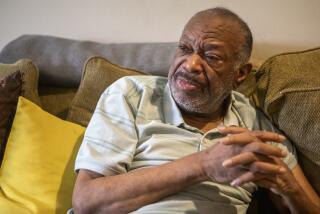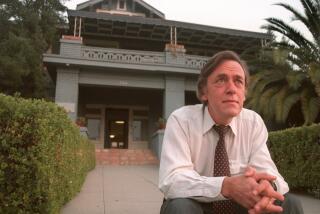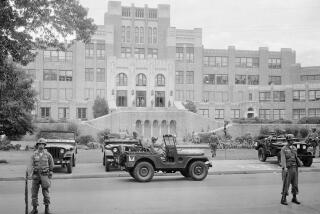Robert L. Carter dies at 94; NAACP attorney fought segregation
Robert L. Carter, who as an NAACP civil rights attorney was an architect of the legal strategy used in the cases that led to Brown vs. Board of Education, the landmark 1954 Supreme Court decision that declared school segregation unconstitutional, has died. He was 94.
Carter, a former U.S. district judge for the southern district of New York, died Tuesday in a hospital in Manhattan after suffering a stroke last week, said his son David.
With law degrees from Howard University School of Law and Columbia Law School, where he wrote his master’s thesis on the 1st Amendment, Carter initially considered an academic career.
Instead, fired up by the racism he experienced while serving as a second lieutenant in the Army Air Forces during World War II, he went to work at the National Assn. for the Advancement of Colored People’s Legal Defense and Education Fund in 1944.
His Army experience, he wrote in “A Matter of Law,” his 2005 memoir, “made a militant of me, and instilled in me a fierce determination to fight against racism with all my intellectual and physical strength.”
As chief legal assistant to general counsel Thurgood Marshall, Carter worked closely with the future U.S. Supreme Court justice.
An associate in their office later likened the charismatic Marshall to being “the wind,” while the more intellectual Carter was “the keel.”
“Carter was a vigorous, careful, devoted attorney fighting for black equality in the courts,” said Richard Kluger, author of “Simple Justice: The History of Brown v. Board of Education and Black America’s Struggle for Equality.”
“Bob had studied to be a legal scholar and was a brilliant strategist, thinker, intellectual,” said Patricia Sullivan, a professor of history at the University of South Carolina who knew Carter.
Although Carter oversaw the preparation of briefs, Sullivan said, “he also went out in the field; he tried cases in every Southern state.”
Sullivan, who specializes in civil rights history, said Carter “was a major architect” of Brown vs. Board of Education.
“It was a series of cases that led to the point where they were going to challenge segregation head on,” she said. “The question was how? What would be the legal argument to challenge the precedent of Plessy vs, Ferguson?,” the 1896 Supreme Court case that said “separate but equal” was constitutional.
While preparing for a trial attacking segregation in public schools in Clarendon County, South Carolina, Carter discovered studies that demonstrated the deleterious effects of segregation on black children’s ability to learn.
That included the work of Kenneth and Mamie Clark, who used black and white dolls in a test that showed the impact of discrimination on black children; the children invariably attributed all negative traits to the black dolls and all positive ones to the white dolls.
Kenneth Clark served as an expert witness in the South Carolina case, and both Clarks sat with Carter at the counsel table in two other cases.
“In the end, in the Supreme Court’s unanimous decision, that was the evidence they relied on to rule that segregation per se was unequal,” Sullivan said.
In the aftermath of Brown vs. Board of Education, Sullivan said, the Southern states mobilized to defy the court and attempt to shut down the NAACP.
Carter, who became the organization’s general counsel in 1956, “challenges that and ultimately wins two major Supreme Court rulings that basically protect the 1st Amendment rights of civil rights organizations to operate in the Southern states,” she said.
Carter also turned his attention to applying the constitutional implications of Brown vs. Board of Education beyond the South. “All through the ‘60s, they litigated cases throughout the North,” Sullivan said.
Carter argued 22 cases before the U.S. Supreme Court and won 21 of them before resigning from the NAACP in 1968.
In 1972, he was appointed a U.S. District Court judge for the southern district of New York. He retired as a senior judge in 2009.
Carter was born March 11, 1917, in Careyville, Fla., and moved with his family to New Jersey when he was 6 weeks old. After his father died when Carter was a year old, his mother supported her eight children working as a domestic and taking in laundry.
Carter, who grew up in Newark and East Orange, graduated from high school at 16 after skipping two grades.
He received scholarships and earned a bachelor’s degree in political science from Lincoln University in Pennsylvania in 1937 before going to law school and serving in the military.
Carter’s wife, Gloria, whom he married in 1946, died in 1971.
In addition to his son David, he is survived by his other son, John, a justice of the New York Supreme Court in the Bronx; a sister, Alma Carter Lawson; and a grandson.
More to Read
Start your day right
Sign up for Essential California for the L.A. Times biggest news, features and recommendations in your inbox six days a week.
You may occasionally receive promotional content from the Los Angeles Times.




















































